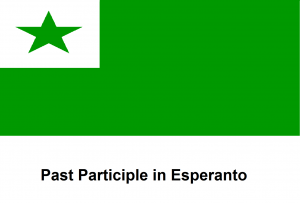Difference between revisions of "Language/Esperanto/Grammar/Past-Participle-in-Esperanto"
Jump to navigation
Jump to search
m (Quick edit) |
m (Quick edit) |
||
| Line 1: | Line 1: | ||
[[File:Past Participle in Esperanto.png|alt=Past Participle in Esperanto|thumb|'''Past Participle in Esperanto''']] | [[File:Past Participle in Esperanto.png|alt=Past Participle in Esperanto|thumb|'''Past Participle in Esperanto''']] | ||
Hello everybody, | Hello everybody, | ||
| Line 8: | Line 7: | ||
Feel free to edit this page by adding new words and expressions ! | Feel free to edit this page by adding new words and expressions ! | ||
Happy learning ! :) | |||
<span link>Take a moment to explore these relevant pages as you conclude this lesson:</span> [[Language/Esperanto/Grammar/Gender|Gender]], [[Language/Esperanto/Grammar/Negation|Negation]], [[Language/Esperanto/Grammar/Nouns|Nouns]] & [[Language/Esperanto/Grammar/WORD-BUILDING|WORD BUILDING]]. | |||
== '''Past Participle in Esperanto''' == | == '''Past Participle in Esperanto''' == | ||
{| class="wikitable sortable" | {| class="wikitable sortable" | ||
| Line 19: | Line 17: | ||
|'''<big>ENGLISH</big>''' | |'''<big>ENGLISH</big>''' | ||
|'''<big>ESPERANTO</big>''' | |'''<big>ESPERANTO</big>''' | ||
|'''<big>PRONUNCIATION | |'''<big>ENGLISH PRONUNCIATION</big>''' | ||
|'''<big>PORTUGUESE</big>''' | |||
| | |||
'''<big>PORTUGUESE</big>''' | |||
|- | |- | ||
| | | | ||
| Line 180: | Line 176: | ||
|} | |} | ||
== | ==Other Lessons== | ||
* [[Language/Esperanto/Grammar/Possessive-pronouns|Possessive pronouns]] | * [[Language/Esperanto/Grammar/Possessive-pronouns|Possessive pronouns]] | ||
* [[Language/Esperanto/Grammar/THE-CORRELATIVES|THE CORRELATIVES]] | * [[Language/Esperanto/Grammar/THE-CORRELATIVES|THE CORRELATIVES]] | ||
| Line 191: | Line 187: | ||
* [[Language/Esperanto/Grammar/Possesive-Adjectives|Possesive Adjectives]] | * [[Language/Esperanto/Grammar/Possesive-Adjectives|Possesive Adjectives]] | ||
* [[Language/Esperanto/Grammar/Past-Tense|Past Tense]] | * [[Language/Esperanto/Grammar/Past-Tense|Past Tense]] | ||
<span links></span> | |||
Latest revision as of 11:03, 27 March 2023
Hello everybody,
In today's lesson you will learn some useful vocabulary about ¨PAST PARTICIPLE¨ in Esperanto
Feel free to edit this page by adding new words and expressions !
Happy learning ! :)
Take a moment to explore these relevant pages as you conclude this lesson: Gender, Negation, Nouns & WORD BUILDING.
Past Participle in Esperanto[edit | edit source]
| ENGLISH | ESPERANTO | ENGLISH PRONUNCIATION | PORTUGUESE |
| I have loved | Mi estas aminta | mih ehs tahs ah mihn tah | Eu amei |
| You have loved | Vi estas aminta | vih ehs tahs ah mihn tah | Você amou |
| He has loved | Li estas aminta | lih ehs tahs ah mihn tah | Ele amou |
| We have loved | Ni estas aminta | nih ehs tahs ah mihn tah | Nós amamos |
| You have loved | Vi estas aminta | vih ehs tahs ah mihn tah | Vocês amaram |
| They have loved | Ili estas aminta | ih lih ehs tahs ah mihn tah | Eles amaram |
| I have spoken | Mi estas pah roh lihn tah | mih ehs tahs pah roh lihn tah | Eu falei |
| You have spoken | Vi estas pah roh lihn tah | vih ehs tahs pah roh lihn tah | Você falou |
| He has spoken | Li estas pah roh lihn tah | lih ehs tahs pah roh lihn tah | Ele falou |
| We has spoken | Ni estas pah roh lihn tah | nih ehs tahs pah roh lihn tah | Nós falamos |
| You have spoken | Vi estas pah roh lihn tah | vih ehs tahs pah roh lihn tah | Vocês falaram |
| They have spoken | Ili estas pah roh lihn tah | ih lih ehs tahs pah roh lihn tah | Eles falaram |
| I have slept | Mi estas dorminta | mih ehs tahs dohr mihn tah | Eu dormi |
| You have slept | Vi estas dorminta | vih ehs tahs dohr mihn tah | Você dormiu |
| He has slept | Li estas dorminta | lih ehs tahs dohr mihn tah | Ele dormiu |
| We have slept | Ni estas dorminta | nih ehs tahs dohr mihn tah | Nós dormimos |
| You have slept | Vi estas dorminta | vih ehs tahs dohr mihn tah | Vocês dormiram |
| They have slept | Ili estas dorminta | ih lih ehs tahs dohr mihn tah | Eles dormiram |
| I have eaten | Mi estas manĝinta | mih ehs tahs mahn jihn tah | Eu comi |
| You have eaten | Vi estas manĝinta | vih ehs tahs mahn jihn tah | Você comeu |
| He has eaten | Li estas manĝinta | lih ehs tahs mahn jihn tah | Ele comeu |
| We have eaten | Ni estas manĝinta | nih ehs tahs mahn jihn tah | Nós comemos |
| You have eaten | Vi estas manĝinta | vih ehs tahs mahn jihn tah | Vocês comeram |
| They have eaten | Ili estas manĝinta | ih lih ehs tahs mahn jihn tah | Eles comeram |
Other Lessons[edit | edit source]
- Possessive pronouns
- THE CORRELATIVES
- Possessive Case in Esperanto
- Interrogation
- Prefixe MAL— and Suffixe —IN
- THE INTERROGATIVE
- Pronouns
- THE NEGATIVE
- Possesive Adjectives
- Past Tense
